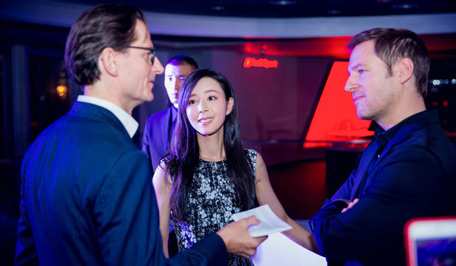German cinema fest brings veteran and young filmmakers to BJ

 0 Comment(s)
0 Comment(s) Print
Print E-mail CNTV, November 16, 2016
E-mail CNTV, November 16, 2016
The Festival of German Cinema is the Oktoberfest for German cinephiles in China. The fourth edition of the festival began in Beijing Friday, bringing 12 contemporary German films to the capital, Chengdu and Shenzhen. Jointly presented by German Films and the Goethe-Institut China, the program this year focuses on teenage lives, the refugee crisis, and migration.
 |
|
German cinema fest brings veteran and young filmmakers to BJ |
"Colonia" opened the festival, with a message to entertain and educate the public. Directed by the Academy Award-winning director Florian Gallenberger, "Colonia" is set against the backdrop of the Chilean military coup and the real "Colonia Dignidad."
"I'm trying to tell the stories which may otherwise be forgotten, like John Rabe is really unknown in Germany and he would be totally forgotten and also this film ‘Colonia' deals with a subject that we started to forget. It's really important to know your history in order to know who you are and in order to do things differently in the future. That's why I want to do it," said Florian Gallenberger.
Chinese actress Zhang Jingchu and Florian Gallenberger are chosen as the honorary patron of this year's event. The two have collaborated seven years ago in China's "Schindler" film "John Rabe."
"For me it's a chance that I could be part of this festival and I can watch the latest German films and also the classics. And I wish I could promote more films to China. And the next year there'll be more German films introduced in China," said Zhang Jingchu.
This year's event focuses on the topic of coming-of-age, echoing the "German-Chinese Year of School and Youth Exchange" jointly opened by German Federal President Joachim Gauck and Chinese President Xi Jinping earlier in March.
Friendship, love and leaving home are experiences that teens around the world can relate to.
"This year's event includes many films depicting lives of German teenagers, and I think it offers a look to how life is like in Germany for Chinese teenagers, because every film takes us on a journey into the fictional reality of its story. I'm sure it will serve as a bridge for further communications between the two countries," said Enrico Brandt, cultural counselor of embassy of Germany.
Another highlight of the festival is on the issue of flight and migration, the theme of "After Spring Comes Fall."
The refugee crisis in Europe is closely monitored and discussed worldwide. The festival makes an important contribution to this discourse by providing a platform for the different perspectives of German filmmakers on the subject.
"Every year we develop the theme further, actually we don't want to look for a different theme all the time, but we look at what kind of films are made and what are the stories they are telling and how can we best present the filmmaking to the audiences. Actually the films find the theme themselves in a way," said Mariette Rissenbeek, managing director of German films.
A Rainer Werner Fassbinder retrospective and Fritz Lang's silent film Destiny showcase the glory of German cinema, fleshed out in FRITZ LANG, a new feature by Gordian Maugg.
"This year is special because we have a wide range of films, and German filmmakers and guests coming, from experienced, Oscar winners to up and coming directors. So it's interesting to see how the public will react to this broad range of guests," said Dr. Clemens Treter, director of Goethe-Institut China.
The Beijing leg wraps up this weekend before heading to Chengdu and Shenzhen. The festival runs until November 24.





